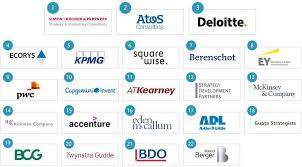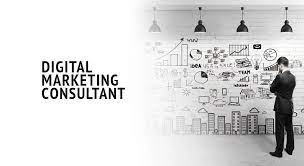Marketing Consultants: Unlocking the Power of Strategic Branding
In today’s competitive business landscape, effective marketing has become more crucial than ever. It is not enough to have a great product or service; businesses need to ensure that their target audience knows about it and understands its value. This is where marketing consultants come into play, offering their expertise and strategic guidance to help companies navigate the complex world of marketing.
Marketing consultants are professionals who specialize in developing and implementing marketing strategies that drive growth and increase brand visibility. They possess a deep understanding of consumer behavior, market trends, and industry best practices. By leveraging their knowledge and experience, marketing consultants can provide valuable insights and recommendations tailored to the unique needs of each client.
One of the key advantages of working with a marketing consultant is their ability to provide an objective perspective. When businesses are deeply involved in day-to-day operations, it can be challenging to step back and see the bigger picture. Marketing consultants bring a fresh set of eyes, enabling them to identify opportunities for improvement and devise innovative strategies that may have been overlooked internally.
Furthermore, marketing consultants excel at conducting thorough market research. They analyze market trends, competitor strategies, and consumer preferences to develop comprehensive marketing plans that resonate with the target audience. By understanding what drives consumer behavior and how competitors position themselves in the market, consultants can help businesses craft compelling messages that differentiate them from the competition.
A key strength of marketing consultants lies in their ability to develop cohesive branding strategies. They work closely with businesses to define their unique value proposition and create a consistent brand identity across various channels. From logo design to messaging guidelines, they ensure that every touchpoint reflects the essence of the brand, fostering trust and recognition among consumers.
Another area where marketing consultants excel is digital marketing. In today’s digital age, an effective online presence is paramount for success. Marketing consultants keep up with the latest digital trends and technologies, helping businesses leverage tools such as search engine optimization (SEO), social media marketing, content creation, and email campaigns to reach their target audience effectively.
Collaboration is at the core of working with marketing consultants. They partner with businesses to understand their goals, challenges, and target audience. By aligning their strategies with these factors, marketing consultants create tailored action plans that maximize return on investment and drive tangible results.
Moreover, marketing consultants offer scalability. Whether a business is a startup looking to establish its brand or an established company seeking to expand into new markets, consultants can adapt their strategies accordingly. They have the flexibility to scale up or down based on business requirements, ensuring that marketing efforts are aligned with growth objectives.
In conclusion, marketing consultants play a pivotal role in helping businesses unlock the power of strategic branding. With their expertise in market research, branding strategies, digital marketing, and more, they provide valuable guidance that can propel companies towards success. By collaborating with marketing consultants, businesses can gain a competitive edge in today’s dynamic marketplace and achieve their growth objectives with confidence.
Frequently Asked Questions about Marketing Consultants: A Comprehensive Guide
- How much is a marketing consultant?
- How much do top marketing consultants make?
- What is a marketing consulting firm?
- What does a marketing consultant do?
- Why you need a Marketing Consultant?
- What does a marketing consultant?
- What skills do you need to be a marketing consultant?
- Do marketing consultants make money?
- What are the services of a marketing consultant?
How much is a marketing consultant?
The cost of hiring a marketing consultant can vary depending on several factors, including their level of experience, expertise, the scope of the project, and the location. Marketing consultants typically charge fees based on an hourly rate, a fixed project fee, or a retainer agreement.
Hourly rates for marketing consultants can range from £50 to £200 or more per hour, depending on their level of experience and the complexity of the work involved. Some consultants may also offer discounted rates for longer-term projects or retainer agreements.
For specific projects with defined deliverables, marketing consultants may provide a fixed project fee. This fee is determined based on the estimated time and resources required to complete the project successfully. The cost will depend on the complexity and scope of the project.
Retainer agreements are another common pricing structure for marketing consultants. In this arrangement, businesses pay a monthly fee to retain ongoing access to the consultant’s services. The retainer fee can vary widely depending on factors such as the consultant’s expertise and availability.
It’s important to note that while hiring a marketing consultant involves costs, it is an investment that can yield significant returns in terms of improved brand visibility, increased customer engagement, and ultimately higher revenue. When considering hiring a marketing consultant, it is advisable to evaluate their track record, expertise in your industry or niche, and their ability to align with your business goals before making a decision.
It is recommended to reach out to multiple marketing consultants for quotes and proposals tailored to your specific needs. This will provide you with a better understanding of pricing ranges in your market and help you make an informed decision based on your budget and desired outcomes.
How much do top marketing consultants make?
The earnings of top marketing consultants vary depending on several factors, including their level of experience, expertise, client base, geographic location, and the scope of services they offer. It’s important to note that compensation can also differ between individual consultants and those working for consulting firms or agencies.
According to industry reports and surveys, top marketing consultants can earn a significant income. Generally, experienced and highly sought-after consultants with a strong track record of success command higher fees. Some top consultants charge hourly rates ranging from £150 – £500 or more per hour. For longer-term projects or retainer-based agreements, they may charge monthly fees starting from £3,000 – £10,000 or higher.
However, it’s important to remember that these figures are indicative and can vary widely based on the factors mentioned earlier. Additionally, fees can be influenced by market demand and economic conditions.
It’s worth noting that while top marketing consultants have the potential to earn substantial incomes, it often reflects their expertise and the value they bring to their clients’ businesses. They possess a deep understanding of marketing strategies and have a proven ability to drive results and deliver a return on investment.
Ultimately, the compensation of top marketing consultants is determined by their reputation in the industry, the quality of their work, and their ability to consistently deliver exceptional results for their clients.
What is a marketing consulting firm?
A marketing consulting firm is a professional service provider that specializes in offering strategic marketing advice and solutions to businesses. These firms are typically comprised of a team of experienced marketing professionals who possess in-depth knowledge of various marketing disciplines and industry trends.
The primary goal of a marketing consulting firm is to help businesses develop and implement effective marketing strategies that drive growth, increase brand visibility, and achieve their business objectives. They work closely with clients to understand their unique needs, target audience, and competitive landscape.
Marketing consulting firms offer a wide range of services, including market research, brand development, digital marketing strategies, advertising campaigns, public relations, social media management, content creation, and more. They provide expert guidance on how to position a brand effectively in the market, differentiate it from competitors, and engage with the target audience through various channels.
One of the key advantages of working with a marketing consulting firm is their external perspective. They bring fresh insights and objective analysis to the table since they are not directly involved in day-to-day operations. This allows them to identify opportunities for improvement and devise innovative strategies that may have been overlooked internally.
Marketing consulting firms also excel at staying up-to-date with the latest industry trends and technologies. They continuously monitor changes in consumer behavior and emerging marketing platforms to ensure that their clients’ strategies remain relevant and effective. By leveraging their knowledge of digital marketing tools such as search engine optimization (SEO), social media advertising, email campaigns, and content creation, they help businesses maximize their online presence.
Collaboration is another crucial aspect of working with a marketing consulting firm. They work closely with clients as strategic partners rather than just service providers. By understanding the client’s goals, challenges, target audience, and budgetary constraints, they develop customized solutions that align with the client’s specific needs.
Additionally, marketing consulting firms often offer scalability. Whether it’s supporting startups in establishing their brand or assisting established companies in expanding into new markets or launching new products, these firms can adapt their strategies to suit the unique requirements of each client. They have the flexibility to scale their services up or down based on the client’s growth objectives and budget.
In summary, a marketing consulting firm is a professional service provider that offers strategic marketing advice and solutions to businesses. By leveraging their expertise in various marketing disciplines, industry knowledge, and external perspective, these firms help businesses develop effective marketing strategies that drive growth, enhance brand visibility, and achieve success in today’s competitive marketplace.
What does a marketing consultant do?
A marketing consultant is a professional who provides expert advice and guidance to businesses in developing and implementing effective marketing strategies. Their primary role is to help businesses achieve their marketing goals, increase brand visibility, and drive growth.
Here are some key responsibilities and activities that a marketing consultant typically undertakes:
- Market Research: Marketing consultants conduct thorough market research to understand industry trends, consumer behavior, and competitor strategies. This research forms the foundation for developing effective marketing plans.
- Strategy Development: Based on market research findings, consultants work closely with businesses to develop comprehensive marketing strategies aligned with their goals and target audience. They define the target market, positioning, messaging, and channels to reach potential customers effectively.
- Branding and Identity: Marketing consultants assist businesses in creating a strong brand identity by defining key brand elements such as logo design, visual guidelines, tone of voice, and brand messaging. They ensure that the brand image is consistent across all marketing channels.
- Digital Marketing: In today’s digital age, online presence is crucial for success. Marketing consultants specialize in various digital marketing techniques such as search engine optimization (SEO), social media advertising, content creation, email campaigns, and website optimization. They leverage these tools to enhance brand visibility and engage with the target audience effectively.
- Campaign Planning and Execution: Consultants help businesses plan targeted marketing campaigns tailored to specific objectives or product launches. They create campaign strategies, select appropriate channels for promotion (e.g., print media, online ads), develop compelling content or creative assets, monitor campaign performance, and make data-driven adjustments as needed.
- Performance Analysis: Marketing consultants analyze the effectiveness of marketing efforts by tracking key performance indicators (KPIs) such as website traffic, conversion rates, customer engagement metrics, or sales data. They use these insights to optimize future campaigns or adjust strategies accordingly.
- Training and Education: Some marketing consultants offer training sessions or workshops for businesses’ internal teams to enhance their marketing skills and knowledge. They may provide guidance on topics such as social media management, content creation, or digital advertising.
- Project Management: Marketing consultants often manage marketing projects on behalf of businesses, coordinating different stakeholders and ensuring that campaigns are executed within budget and timeline constraints.
- Stay Updated with Industry Trends: Marketing consultants continuously stay updated with the latest industry trends, emerging technologies, and best practices in marketing. They attend conferences, participate in professional development programs, and engage in ongoing learning to provide clients with cutting-edge strategies.
Overall, a marketing consultant serves as a trusted advisor to businesses, providing strategic direction, expertise, and insights to help them navigate the complex world of marketing successfully. Their goal is to maximize the impact of marketing efforts and help businesses achieve their growth objectives.
Why you need a Marketing Consultant?
In today’s competitive business landscape, having a marketing consultant by your side can provide numerous benefits and give you a significant advantage. Here are some compelling reasons why you need a marketing consultant:
- Expertise and Knowledge: Marketing consultants are professionals who specialize in the field of marketing. They possess extensive knowledge and expertise in various marketing strategies, tactics, and industry best practices. Their deep understanding of consumer behavior, market trends, and effective marketing techniques allows them to provide valuable insights and recommendations tailored to your business.
- Objectivity and Fresh Perspective: When you’re deeply involved in your own business operations, it can be challenging to see the bigger picture objectively. Marketing consultants bring an outsider’s perspective and offer an unbiased view of your business, industry, and target audience. Their objectivity helps identify blind spots, uncover new opportunities, and devise innovative strategies that may have been overlooked internally.
- Market Research and Analysis: Marketing consultants excel at conducting comprehensive market research. They analyze market trends, competitor strategies, consumer preferences, and demographics to gain valuable insights into your target audience. This research forms the foundation for developing effective marketing plans that resonate with your customers and differentiate you from competitors.
- Strategic Planning: Marketing consultants work closely with you to define your goals, objectives, and target audience. They help develop strategic marketing plans that align with your overall business objectives. By creating a roadmap for success, they ensure that every marketing effort is purposeful, measurable, and contributes to the growth of your business.
- Branding Expertise: Building a strong brand identity is crucial for success in today’s marketplace. Marketing consultants have expertise in branding strategies that help define your unique value proposition and create a cohesive brand identity across all channels. From logo design to messaging guidelines, they ensure consistency in brand representation to foster trust among consumers.
- Digital Marketing Excellence: In the digital age, having an effective online presence is essential for businesses of all sizes. Marketing consultants are well-versed in the latest digital marketing trends and technologies. They can help you navigate the complex world of digital marketing, including search engine optimization (SEO), social media marketing, content creation, and email campaigns. Their expertise ensures that your online presence is optimized to reach and engage your target audience effectively.
- Cost-Effective Solutions: Hiring a full-time marketing team can be costly for many businesses, especially startups or small enterprises. Engaging a marketing consultant provides a cost-effective solution as you only pay for the services and expertise you need when you need them. This flexibility allows you to access professional marketing guidance without incurring the expenses associated with a permanent team.
In summary, working with a marketing consultant brings invaluable expertise, objectivity, strategic planning, branding excellence, digital marketing know-how, and cost-effective solutions to your business. Their guidance can help you navigate the complexities of the market, differentiate your brand from competitors, and ultimately achieve your business goals with confidence.
What does a marketing consultant?
A marketing consultant is a professional who provides expert advice and guidance to businesses regarding their marketing strategies and activities. Their main role is to help businesses develop effective marketing plans that drive growth, increase brand visibility, and achieve their marketing objectives.
Here are some of the key responsibilities and tasks of a marketing consultant:
- Strategic Planning: Marketing consultants work closely with businesses to understand their goals, target audience, and competitive landscape. They conduct thorough market research to identify opportunities and develop comprehensive marketing strategies that align with the company’s objectives.
- Market Research: Consultants analyze market trends, consumer behavior, and competitor strategies to gain insights into the industry. This research helps them identify target markets, customer preferences, and positioning opportunities for the business.
- Branding: Marketing consultants assist businesses in developing a strong brand identity. They help define the unique value proposition of the company and create consistent messaging across various channels. This includes logo design, brand guidelines, tone of voice, and visual elements that reflect the essence of the brand.
- Digital Marketing: With expertise in digital platforms and technologies, marketing consultants help businesses leverage online channels effectively. They develop digital marketing strategies that may include search engine optimization (SEO), social media marketing, content creation, email campaigns, and online advertising to reach target audiences.
- Campaign Development: Consultants assist in creating effective marketing campaigns tailored to specific objectives or product launches. They develop campaign concepts, messaging frameworks, creative assets, and media plans to ensure maximum impact.
- Analytics and Measurement: Marketing consultants track campaign performance using various metrics such as website traffic, conversion rates, social media engagement, or customer surveys. They analyze data to assess effectiveness and make data-driven recommendations for future improvements.
- Training and Education: Consultants may also provide training sessions or workshops for internal teams on topics such as branding guidelines, digital marketing best practices or social media management tools. This helps empower businesses with the knowledge needed for ongoing marketing success.
- Project Management: Marketing consultants often oversee the implementation of marketing initiatives, working closely with internal teams or external vendors to ensure campaigns are executed smoothly and on time.
Overall, a marketing consultant brings expertise, industry knowledge, and a fresh perspective to businesses. They help companies navigate the complexities of the marketing landscape, develop effective strategies, and achieve their marketing goals with confidence.
What skills do you need to be a marketing consultant?
Being a successful marketing consultant requires a combination of skills and expertise. Here are some key skills that are essential for a marketing consultant:
- Strategic Thinking: Marketing consultants need to have strong analytical and strategic thinking abilities. They should be able to assess market trends, consumer behavior, and competitive landscapes to develop effective marketing strategies that align with the client’s goals.
- Communication Skills: Excellent communication skills, both written and verbal, are crucial for marketing consultants. They need to effectively convey their ideas, recommendations, and strategies to clients and team members. Additionally, they should possess active listening skills to understand client needs and objectives.
- Creativity: Marketing consultants should have a creative mindset to develop innovative solutions that differentiate their clients from competitors. They need to think outside the box when creating marketing campaigns, content strategies, or branding initiatives.
- Market Research: Strong research skills are essential for gathering relevant data on market trends, consumer preferences, and competitor analysis. Marketing consultants should be adept at conducting qualitative and quantitative research to inform their strategies effectively.
- Digital Marketing Knowledge: In today’s digital age, having a solid understanding of digital marketing is crucial for marketing consultants. This includes knowledge of SEO (Search Engine Optimization), social media platforms, content creation, email marketing, analytics tools, and more.
- Project Management: Marketing consultants often work on multiple projects simultaneously while adhering to deadlines and budgets. Effective project management skills are necessary to ensure smooth execution of campaigns and initiatives.
- Adaptability: The marketing landscape is constantly evolving with new technologies and trends emerging regularly. Marketing consultants need to be adaptable and open-minded in embracing change while staying updated with the latest industry developments.
- Interpersonal Skills: Building strong relationships with clients is vital for success as a marketing consultant. Developing trust, actively listening to client needs, managing expectations effectively, and collaborating with various stakeholders are all part of the interpersonal skills required in this role.
- Business Acumen: Understanding business fundamentals and having a grasp of financial concepts is important for marketing consultants. They should be able to assess the impact of marketing strategies on a client’s bottom line and make recommendations that align with business objectives.
- Continuous Learning: Marketing consultants should have a passion for continuous learning and self-improvement. Staying updated with industry trends, attending conferences, taking relevant courses, and seeking new knowledge are essential to provide clients with the most effective strategies.
While these skills are important, it’s worth noting that marketing consultants often specialize in specific areas such as branding, digital marketing, or market research. Having expertise in a particular niche can enhance their value and effectiveness in delivering tailored solutions to clients.
Do marketing consultants make money?
Yes, marketing consultants typically charge fees for their services and expertise. The fees can vary depending on factors such as the consultant’s experience, the scope of the project, and the level of involvement required. Marketing consultants may charge hourly rates, project-based fees, or retainers for ongoing support. The amount they earn can also be influenced by factors such as reputation, demand for their services, and the size and complexity of the clients they work with. Ultimately, marketing consultants make money by providing valuable insights, strategic guidance, and implementation support to businesses seeking to enhance their marketing efforts and achieve their goals.
What are the services of a marketing consultant?
Marketing consultants offer a wide range of services to help businesses improve their marketing strategies and achieve their goals. Some of the key services provided by marketing consultants include:
- Marketing strategy development: Marketing consultants work closely with businesses to develop comprehensive marketing strategies aligned with their objectives. They analyze market trends, target audience, and competition to create a roadmap for success.
- Market research: Marketing consultants conduct thorough research to gather insights about consumer behavior, market trends, and competitor strategies. This research helps businesses make informed decisions about product positioning, target audience segmentation, and messaging.
- Branding and positioning: Consultants help businesses define their unique value proposition and develop a strong brand identity. They assist in creating compelling brand messages, designing logos and visual elements, and ensuring consistency across all marketing channels.
- Digital marketing: With expertise in digital platforms and tools, marketing consultants provide guidance on online advertising, search engine optimization (SEO), social media marketing, content creation, email campaigns, and other digital strategies to increase brand visibility and reach the target audience effectively.
- Advertising campaigns: Marketing consultants design and execute targeted advertising campaigns across various channels such as print media, television, radio, online platforms, or social media. They help businesses identify the most effective channels to reach their target audience while maximizing return on investment.
- Content marketing: Consultants assist in creating engaging content that resonates with the target audience. This includes developing blog posts, articles, videos, infographics, whitepapers or any other form of content that aligns with the business’s objectives.
- Market segmentation and targeting: Marketing consultants help businesses identify specific market segments that offer the highest potential for growth. They assist in tailoring marketing messages to appeal to these segments effectively.
- Marketing analytics: Consultants utilize data analytics tools to track campaign performance and measure key performance indicators (KPIs). By analyzing data insights, they provide actionable recommendations for optimizing marketing efforts.
- Marketing training and workshops: Marketing consultants offer training sessions and workshops to educate businesses on marketing best practices, industry trends, and new technologies. These sessions empower businesses to enhance their in-house marketing capabilities.
- Marketing project management: Consultants can oversee and manage marketing projects on behalf of businesses, ensuring that timelines, budgets, and objectives are met. They provide project coordination, vendor management, and quality control to deliver successful outcomes.
It’s important to note that the specific services provided by marketing consultants may vary depending on their expertise, industry focus, and the unique needs of each client.







